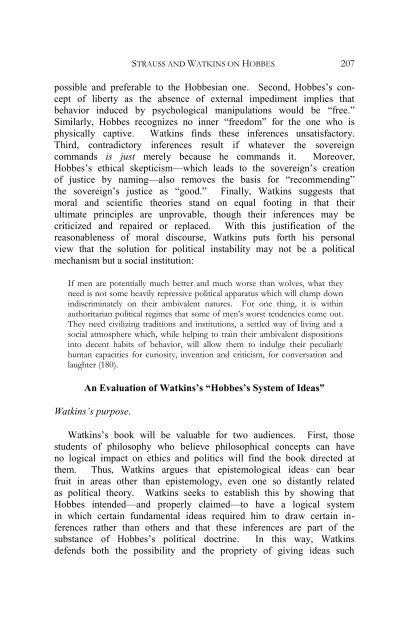Strauss and Watkins on Hobbes' Political Philosophy: A Review
Strauss and Watkins on Hobbes' Political Philosophy: A Review
Strauss and Watkins on Hobbes' Political Philosophy: A Review
You also want an ePaper? Increase the reach of your titles
YUMPU automatically turns print PDFs into web optimized ePapers that Google loves.
STRAUSS AND WATKINS ON HOBBES 207<br />
possible <str<strong>on</strong>g>and</str<strong>on</strong>g> preferable to the Hobbesian <strong>on</strong>e. Sec<strong>on</strong>d, Hobbes’s c<strong>on</strong>-<br />
cept of liberty as the absence of external impediment implies that<br />
behavior induced by psychological manipulati<strong>on</strong>s would be “free.”<br />
Similarly, Hobbes recognizes no inner “freedom” for the <strong>on</strong>e who is<br />
physically captive. <str<strong>on</strong>g>Watkins</str<strong>on</strong>g> finds these inferences unsatisfactory.<br />
Third, c<strong>on</strong>tradictory inferences result if whatever the sovereign<br />
comm<str<strong>on</strong>g>and</str<strong>on</strong>g>s is just merely because he comm<str<strong>on</strong>g>and</str<strong>on</strong>g>s it. Moreover,<br />
Hobbes’s ethical skepticism—which leads to the sovereign’s creati<strong>on</strong><br />
of justice by naming—also removes the basis for “recommending”<br />
the sovereign’s justice as “good.” Finally, <str<strong>on</strong>g>Watkins</str<strong>on</strong>g> suggests that<br />
moral <str<strong>on</strong>g>and</str<strong>on</strong>g> scientific theories st<str<strong>on</strong>g>and</str<strong>on</strong>g> <strong>on</strong> equal footing in that their<br />
ultimate principles are unprovable, though their inferences may be<br />
criticized <str<strong>on</strong>g>and</str<strong>on</strong>g> repaired or replaced. With this justificati<strong>on</strong> of the<br />
reas<strong>on</strong>ableness of moral discourse, <str<strong>on</strong>g>Watkins</str<strong>on</strong>g> puts forth his pers<strong>on</strong>al<br />
view that the soluti<strong>on</strong> for political instability may not be a political<br />
mechanism but a social instituti<strong>on</strong>:<br />
If men are potentially much better <str<strong>on</strong>g>and</str<strong>on</strong>g> much worse than wolves, what they<br />
need is not some heavily repressive political apparatus which will clamp down<br />
indiscriminately <strong>on</strong> their ambivalent natures. For <strong>on</strong>e thing, it is within<br />
authoritarian political regimes that some of men’s worst tendencies come out.<br />
They need civilizing traditi<strong>on</strong>s <str<strong>on</strong>g>and</str<strong>on</strong>g> instituti<strong>on</strong>s, a settled way of living <str<strong>on</strong>g>and</str<strong>on</strong>g> a<br />
social atmosphere which, while helping to train their ambivalent dispositi<strong>on</strong>s<br />
into decent habits of behavior, will allow them to indulge their peculiarly<br />
human capacities for curiosity, inventi<strong>on</strong> <str<strong>on</strong>g>and</str<strong>on</strong>g> criticism, for c<strong>on</strong>versati<strong>on</strong> <str<strong>on</strong>g>and</str<strong>on</strong>g><br />
laughter (180).<br />
An Evaluati<strong>on</strong> of <str<strong>on</strong>g>Watkins</str<strong>on</strong>g>’s “Hobbes’s System of Ideas”<br />
<str<strong>on</strong>g>Watkins</str<strong>on</strong>g>’s purpose.<br />
<str<strong>on</strong>g>Watkins</str<strong>on</strong>g>’s book will be valuable for two audiences. First, those<br />
students of philosophy who believe philosophical c<strong>on</strong>cepts can have<br />
no logical impact <strong>on</strong> ethics <str<strong>on</strong>g>and</str<strong>on</strong>g> politics will find the book directed at<br />
them. Thus, <str<strong>on</strong>g>Watkins</str<strong>on</strong>g> argues that epistemological ideas can bear<br />
fruit in areas other than epistemology, even <strong>on</strong>e so distantly related<br />
as political theory. <str<strong>on</strong>g>Watkins</str<strong>on</strong>g> seeks to establish this by showing that<br />
Hobbes intended—<str<strong>on</strong>g>and</str<strong>on</strong>g> properly claimed—to have a logical system<br />
in which certain fundamental ideas required him to draw certain in-<br />
ferences rather than others <str<strong>on</strong>g>and</str<strong>on</strong>g> that these inferences are part of the<br />
substance of Hobbes’s political doctrine. In this way, <str<strong>on</strong>g>Watkins</str<strong>on</strong>g><br />
defends both the possibility <str<strong>on</strong>g>and</str<strong>on</strong>g> the propriety of giving ideas such
















